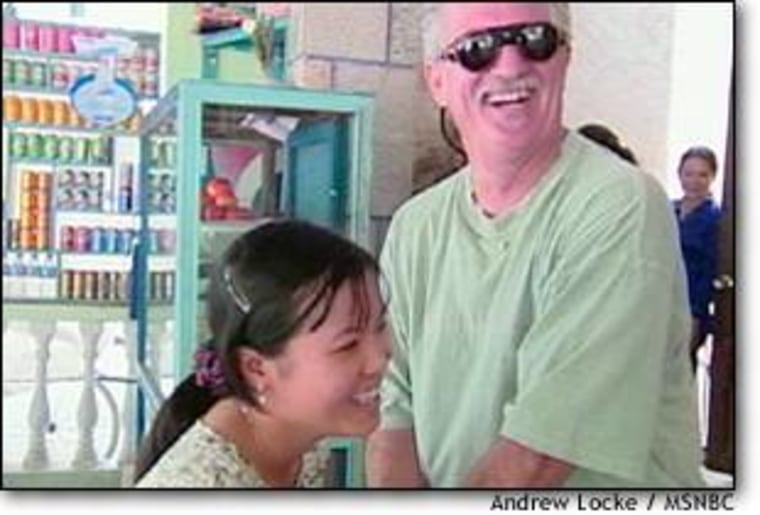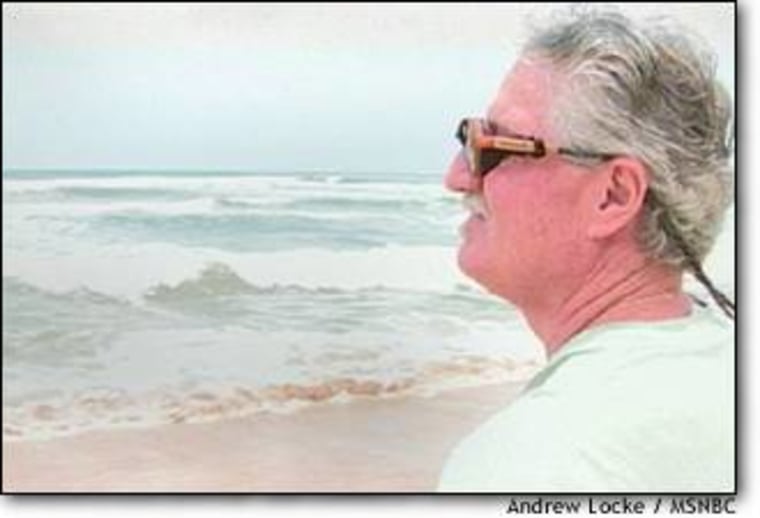It was 1969. American casualties were mounting and so were the horror stories. The news had just emerged about the massacre by U.S. soldiers at the village of My Lai. That’s when 19-year-old U.S. Marine Rick Janovich arrived in Danang. Now, at age 50, he’s come back to a place he once thought of as hell.
It's ironic, and Rick is the first to admit it.
“I have tapes that I used to send home (from Vietnam) to my parents. I listen to the tapes now and I think ‘how weird. All I can think about is being here now, but at the time, every tape I’m constantly saying I can’t wait to get out of here, I can’t wait to get out of here. I want to go home. I want to go home’.”
But as Tom Wolfe once said, “You can’t go home again” — not after what Rick experienced in Vietnam. Though he was in the U.S. and married for many years, he’s now back in Vietnam, living in a hotel room overlooking a busy street in Danang, and wrestling with the demons of war. Here, doing volunteer work, helping the new Vietnam, he’s coping better than he had for years.
Locked inside
The worst effects of war didn’t hit him immediately. He was married, had children, and worked as an arborist — an expert on trees. “The first ten or 15 years of my marriage ... I look at it as relatively normal,” he says. When his two sons were young, he coached soccer and baseball, worked, and remained mostly silent about his wartime experiences.
“I had everything locked away. I wasn’t a Vietnam veteran, to anyone. I was just Rick, the neighbor.”
But after seeing the 1987 Oliver Stone film Platoon — a graphic account of the Vietnam ground combat — Rick started falling apart. “It was like someone opened that door, and everything in that closet came out. And I just went downhill.”
There were bouts of depression, nightmares, and bursts of anger. Despite the cocktail of anti-depressants and other drugs, the turmoil persisted and worsened.
One day, he says: “I couldn’t stop crying. I’m trimming my tree and I’m crying my eyes out. And I’m thinking, ‘What the hell is going on?’”
But being diagnosed with post-traumatic stress didn’t cure it. Rick’s marriage deteriorated. He became “a mushroom,” he says, spending the daylight hours in isolation, or sleeping.
Back to the scene
Finally, his dismal existence spurred Rick to take drastic action — and return to the battlefields of his youth.

His first trip, in 1992, was to deliver medical supplies to a clinic in Danang and on successive trips. Other trips followed. Now he’s planning to stay in the only place he manages to find some peace.
Rick now works as a full-time volunteer work at the Global Village Foundation, a U.S. non-profit that works with orphans, built a clinic and is now opening a model village, to provide job training and revive some of Vietnam’s pre-war handicrafts. The foundation is run by Le Ly Hayslip, who as a child worked for the Vietcong. Hayslip, whose autobiography “Heaven and Earth” was the basis for the third part of Oliver Stone’s Vietnam trilogy, remains controversial in the U.S., and is regularly picketed by the anti-communist Vietnamese American groups.
But the attitudes of Rick and Le Ly — two former enemies — are quite simple. “There’s nothing I can do about the past,” says Hayslip. “I’m just trying to do something positive for the future.”
Rick goes beyond his formal work, using his modest military benefits to sponsor a Vietnamese orphan he describes as his “daughter,” and helps out a half dozen other friends when they need it.
Seeking peace
Rick took up the cause of an Amerasian woman in Hoi An, near Danang, who is the abandoned daughter of an American G.I. He even went as far as calling the father, now a successful lawyer in Florida — a failed effort to force the guy to be responsible for her. “He hung up on me,” Rick says.
It’s clearly difficult for Rick to feel he’s doing enough. He hopes for funding for a housing project at the foundation’s model village — a project he could really sink his teeth into. “Sometimes I just feel like I’m spitting in the wind,” he says.
Even as he makes amends with the people he once fought, Rick struggles with the memories of brutality from the war. He watched his buddies die, and knew the betrayal of Vietnamese who worked both sides — including his barber. The volatile mix of distrust and fear led his platoon to go into civilian homes and destroy them, something he looks back at with wonder. “But it was, you kept telling yourself, there’s no rules, during war. Even though there was a whole bunch of rules, you keep telling yourself, there’s no rules, there’s no rules. We can’t have rules, because if we have rules, we’re gonna die.”
For Rick, there are no easy answers, but helping Vietnam recover its vitality seems to be the key to recovering his own. The nightmares don’t disappear, but they diminish. And in Vietnam, there are people who understand the war, even if they were on the other side.
“My doctors tell me that I’m looking for a silver bullet — a pill that’s gonna make me Rick, 1968. And they said you’re never gonna find it. And in Vietnam, I’m not gonna find it,” he says. “But I have found that when I’m here I function, and to me that’s at least a part of Rick.”
Battle Scars is a joint production of Newsweek and MSNBC, with MSNBC’s Andrew Locke producing the video images.
